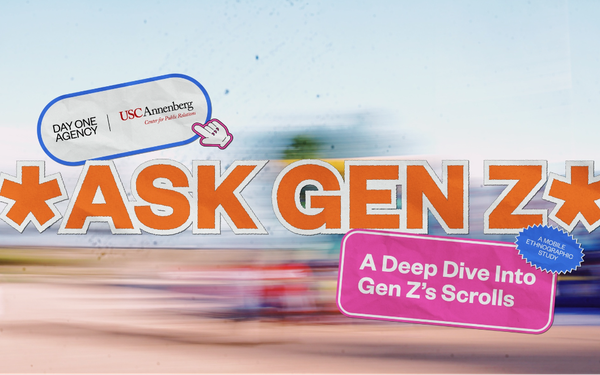Gen Z's Love-Hate Struggle With TikTok Rabbit Holes
- by Sarah Mahoney @mahoney_sarah, June 12, 2023

Gen Z may not be sure what news is, where they get it or why they can't stop scrolling. But a novel study from the USC Center for Public Relations and Day One Agency finds members of this cohort are well-informed -- but a little sheepish about how much time they spend on their phones.
The ethnographic research set out to find out where Gen Z gets its news, says Fred Cook, director of the USC Center for Public Relations, who directed the study.
"They don't read magazines, they don't read newspapers, they don't watch television news," he says. "And from that, you might assume they're not media-literate. But they're very informed and aware of what's going on. They just get their information from different sources. And they spend more time seeking out information, rather than just having it handed to them."
Day One was looking for more Gen Z insight for clients, says Josh Rosenberg, chief executive officer and co-founder.
advertisement
advertisement
Both clients and agency were startled to learn most respondents said they start their day with between 20 and 30 minutes of TikTok scrolling.
"That's a source of both pleasure and panic to them," Rosenberg says. Gen Z-ers are acutely aware of wanting to rein in their screen time. "But they say, 'I just wanted to laugh in the morning and make sure I'm alive.' It's the way they greet the world."
Cook says students commonly discuss digital detoxes, whether they log off for a weekend, a day or a few hours.
The research methodology was both deep and narrow. The study included 34 eligible USC students born, born between 1997 and 2004, primarily female, to record 10-minute videos of themselves while performing five different tasks over one week.
The tasks included morning and evening media audits, where they tracked 60 minutes of what they watched, read, listened to or scrolled through, and then commented on the content and how it made them feel. Another part of the study asked participants to describe a piece of content that changed their perspective, how they found it, and why they thought it was so influential. Another asked them to analyze a recent, non-routine decision, describing how they found the information that guided them through their options.
Cook thinks the findings highlight the considerable differences between the media consumption habits of these kids' parents and older siblings, and paint a picture of how the landscape will shift to accommodate Gen Z's habits.
Rosenberg says "rich storytelling across micro-moments" is more critical for brands. "And this idea of recommendation is super-powerful right now," he says. "Every Gen Z person, whether they are making a purchase, going to a movie, going to a restaurant, is looking at recommendations from other people like them."
This leads them into research rabbit holes, "a term that came up in much of this research," Cook says. "They'd find themselves watching up to seven to 10 minutes of video by an influencer on that specific topic."
Going into the research, the team debated whether to use the word "news" at all. "Everything comes to them from their scrolls. They consider news anything new to them or interesting," Cook says. "In the end, we used the word 'content' because 'news' seemed too limiting.
"We saw that these Gen Z students are very sophisticated in terms of their analysis of media," he adds. "They're getting information fast and furious on their phones from many sources. And they still are very able to discern what's real and what isn't real, just as we did, as we grew up doing that with newspapers and radio and TV."


